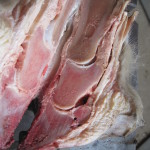 Overview of the Horse's Foot (27-minute video)
Overview of the Horse's Foot (27-minute video)
Trimming a horse is definitely not “a one size fits all”. From external to internal: learn all the parts of a hoof. Taking this knowledge, apply it to trimming horses according to its foot conformation.
 Dissection of Horse's Foot (10-minute video)
Dissection of Horse's Foot (10-minute video)
Jake dissects a horse foot and shows the five sensitive structures that correspond to the five insensitive structures.
 Review of Lower Leg Anatomy (30-minute video)
Review of Lower Leg Anatomy (30-minute video)
How many tendons in the lower leg? What are they?
+Learn about horse bones, ligaments, tendons – and how they fit together.
-
0:30 How many bones are there below the horse’s knee or hock?
1:09 List of bones for front leg
1:55 When do the different growth plates close? The further away from the body, the sooner they close. See the list.
4:14 Learn the difference between the front and hind cannon bones.
6:40 How many joints in the lower leg?
8:06 Find out all about horses' ligaments: what, where and purpose, beginning with collateral (binding) ligaments
9:00 Navicular ligaments
9:52 Suspensory ligament of navicular bone
11:12 Sesamoidean ligaments
14:13 Suspensory ligament
15:25 Interosseous ligaments of splint bones
15:50 Capsular ligaments
16:16 Pastern ligaments
16:40 Annular ligaments
17:30 Check ligaments. What are the check ligaments and what do they do?
20:44 What are the characteristics of tendons? Learn here.
23:35 Superficial flexor tendon
25:00 Common or long extensor tendon
25:27 Lateral extensor tendon
 Anatomy of Hoof: Review (19-minute video)
Anatomy of Hoof: Review (19-minute video)
+Jacob Butler reviews...
-
Coffin bone shapes
Bones below the knee or hock
How to draw the horse's leg
And more....
 Foot Conformation Types (32-minute video)
Foot Conformation Types (32-minute video)
+Learn what an ideal foot looks like, then learn about those that are not—and they are many—and how to trim and shoe them properly.
-
0:27 What every horse owner wants: a horse with an ideal hoof. See the characteristics of what comprises an ideal hoof; explanation of wall, quarters, toe angle, sole, frog, and heel.
1:28 Next, we compare the ideal hoof with those that are not -- and how to trim and shoe accordingly, beginning with a hoof with a broken back axis and one with a broken forward axis
2:00 Flared foot
3:08 Dished foot
4:12 Bull-nosed foot plus x-ray of the cause
6:12 Flat foot 7:07 Dropped sole
8:07 Thin wall and sole
8:56 Thick wall and sole
9:53 Hoof growth rings
10:54 False quarter
12:16 Cleft
14:04 Coon foot
15:02 Contracted foot
17:17 Dubbed foot
18:10 Brittle hoof
21:00 Sheared heels
21:50 Underrun heels
24:46 Stumpy heels
25:29 Clubfoot: find out the causes and ways to alleviate this condition through leg exercises shown here.
